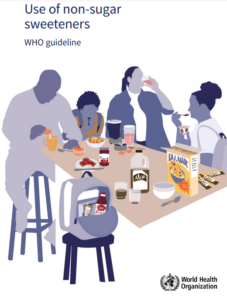Join Health Affairs for a virtual conversation between me and Angela Odoms-Young of Cornell University discussing the evolution of US food and nutrition policy, the current policy landscape, and thoughts on what lies ahead. It’s at 1:00 p.m. EDT. To join the Webinar, click here.
Weekend reading: WHO’s new guidance on artificial sweeteners
A press release from the World Health Organization announces recommendations on the use of artificial, non-nutritive (meaning no-calorie) sweeteners: WHO advises not to use non-sugar sweeteners for weight control in newly released guideline.
The recommendation is based on the findings of a systematic review of the available evidence which suggests that use of NSS does not confer any long-term benefit in reducing body fat in adults or children. Results of the review also suggest that there may be potential undesirable effects from long-term use of NSS, such as an increased risk of type 2 diabetes, cardiovascular diseases, and mortality in adults.

The recommendation not to use artificial sweeteners for weight control or chronic disease prevention applies to:
all synthetic and naturally occurring or modified non-nutritive sweeteners that are not classified as sugars. Common NSS include acesulfame K, aspartame, advantame, cyclamates, neotame, saccharin, sucralose, stevia and stevia derivatives.
The guideline document notes:
The recommendation in this guideline was made based on evidence that suggests that there may be health effects associated with NSS use irrespective of which NSS is being used – that is, NSS as a class of compounds, despite individual NSS having different chemical structures, may have an impact on health…individual NSS have different sweetness intensities and organoleptic properties, and are processed differently by the body. Although limited evidence suggests that individual NSS may also differ in some of their physiological effects in humans, the evidence is currently insufficient to make
recommendations for individual NSS.
Overall, the evidence summarized in the document shows benefits from short-term studies but not ones that last longer than three months or so. After that, use of non-nutritive sweeteners is associated with potential harm.
At issue, of course, is the mechanism. These remain speculative: calorie compensation? mainenance of taste preference? microbiome?
Much of the research into biological mechanisms has been carried out in in vitro and rodent models, and further research is needed to determine whether observations in non-human models translate to humans. Although there are as yet no conclusive mechanistic links between NSS use and many of the associations observed in prospective cohort studies, that plausible mechanisms have been identified, tested and in some cases validated (albeit mostly in non-human models) reinforces the seriousness with which the associations observed in prospective cohort studies should be considered and highlights the need for further exploration of possible mechanisms with additional research.
Until then, it seems best to avoid them (I don’t like their taste anyway).
Questions?
- Please email any questions to: NFS@who.int

